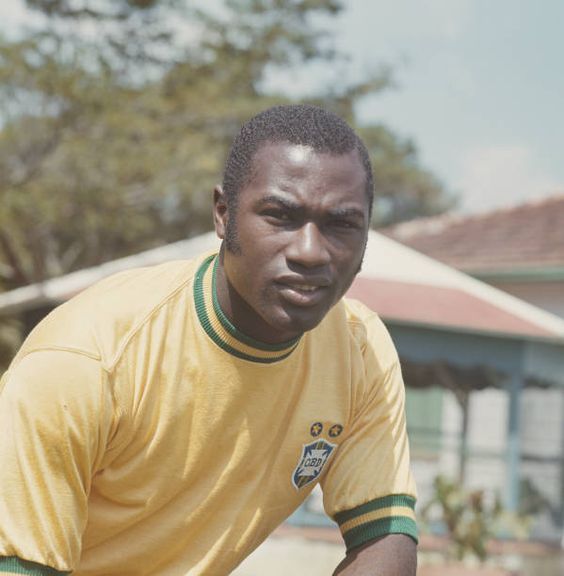1. Early Life and Career Beginnings
Edu was born Jonas Eduardo Américo on August 6, 1949, in Jaú (JaúPortuguese), a municipality in the state of São Paulo (São PauloPortuguese), Brazil. His football journey began at a young age, leading him to join the youth ranks of Santos (full name: Santos Futebol ClubePortuguese), a prominent club in the state of São Paulo. He quickly rose through the ranks, demonstrating exceptional talent that paved the way for his professional debut at an early age.
2. Club Career
Edu's club career was marked by a long and successful tenure at Santos FC, followed by spells at other notable clubs in Brazil and Mexico.
2.1. Santos FC
Edu's professional career began in 1966 when he joined Santos. He spent ten significant seasons with the club, from 1966 to 1976, establishing himself as a vital forward. During his time at Santos, Edu made 584 appearances and scored 183 goals, contributing immensely to the club's success. He was instrumental in Santos winning four Campeonato Paulista (Campeonato PaulistaPaulista ChampionshipPortuguese) titles (in 1967, 1968, 1969, and 1973), the Torneio Rio-São Paulo (Torneio Rio-São PauloPortuguese) in 1966, the Campeonato Brasileiro (Campeonato BrasileiroBrazilian ChampionshipPortuguese) in 1968, and the Intercontinental Champions' Supercup in 1968. His consistent performance earned him the Brazilian Silver Ball Award (Bola de PrataSilver BallPortuguese) in 1971, recognizing him as one of the best players in the Brazilian league.

2.2. Later Club Career
After leaving Santos FC in 1976, Edu continued his club career across several teams, showcasing his enduring talent. In 1976, he played for Corinthians (full name: Sport Club Corinthians PaulistaPortuguese), making 40 appearances and scoring 5 goals. Although his time at Corinthians was brief, he was part of the squad that won the Campeonato Paulista in 1977. In 1977, he moved to Internacional (full name: Sport Club InternacionalPortuguese), where he played 9 matches and scored 2 goals.
From 1977 to 1983, Edu ventured abroad to play for Tigres UANL (full name: Club de Fútbol Tigres de la Universidad Autónoma de Nuevo LeónSpanish) in Mexico, where he made 59 appearances and scored 3 goals. Following his time in Mexico, he returned to Brazil, joining São Cristóvão (full name: São Cristóvão de Futebol e RegatasPortuguese) in 1983. He then played for Nacional Fast Clube (full name: Nacional Fast ClubePortuguese) from 1984 to 1985, appearing in 22 matches and scoring 4 goals. His final professional club was CE Don Vasco (full name: Clube Esportivo Don VascoPortuguese), where he played in 1985 before retiring from professional football. Throughout his club career, Edu accumulated a total of 714 appearances and scored 197 goals.
3. National Team Career
Edu's national team career for Brazil spanned from June 1966 to June 1976. During this period, he earned 42 caps and scored eight goals for the Brazilian national football team, participating in some of the most iconic moments in Brazilian football history.
3.1. FIFA World Cup Appearances
Edu holds a unique distinction in FIFA World Cup history, having been called up for three consecutive tournaments. He was selected for the 1966, 1970, and 1974 FIFA World Cups.
His first call-up came for the 1966 FIFA World Cup in England. At the start of the tournament, Edu was just 16 years and 339 days old, making him the youngest player ever to be called up for a World Cup squad. Despite this remarkable achievement, he did not feature in any matches during the 1966 tournament.
He was part of the legendary squad that won the 1970 FIFA World Cup in Mexico, a team widely regarded as one of the greatest of all time. Edu played one match in this tournament, contributing to Brazil's triumphant campaign.
Edu made his third and final World Cup appearance at the 1974 FIFA World Cup in West Germany, where he also played one match. His participation in three World Cups solidified his place in Brazilian football history, showcasing his longevity and consistent presence at the highest level of international football.
4. Post-Retirement Activities
After retiring from professional football in 1985, Edu continued to stay involved with the sport. He frequently participated in exhibition matches as part of various all-stars masters teams, touring and showcasing his skills to fans. These appearances allowed him to maintain a connection with the game and its supporters, celebrating the legacy of his playing career.
5. Honours
Edu amassed an impressive collection of titles and awards throughout his career:
- Santos
- Torneio Rio-São Paulo: 1966
- Campeonato Paulista: 1967, 1968, 1969, 1973
- Campeonato Brasileiro: 1968
- Intercontinental Champions' Supercup: 1968
- Corinthians
- Campeonato Paulista: 1977
- Brazil
- FIFA World Cup: 1970
- Individual
- Brazilian Silver Ball Award: 1971
6. Legacy and Assessment
Edu's legacy in football is significant, marked by his exceptional talent, longevity, and key contributions to both club and country. As a forward, he was known for his speed, dribbling ability, and clinical finishing, making him a formidable opponent for defenders. His ten-year tenure at Santos FC, playing alongside iconic figures like Pelé, cemented his status as a pivotal player in one of the most successful eras of Brazilian club football. His instrumental role in winning multiple Campeonato Paulista titles and other domestic and international honors with Santos underscores his impact.
Internationally, Edu's three World Cup appearances, culminating in the 1970 championship, highlight his standing among Brazil's elite footballers. His record as the youngest player ever called up for a World Cup squad speaks to his prodigious talent recognized from an early age. Edu is remembered not just for his individual skill but also for being a vital part of highly successful teams, embodying the vibrant and expressive style of Brazilian football that captivated audiences worldwide. His career is a testament to dedication and enduring quality in the sport.